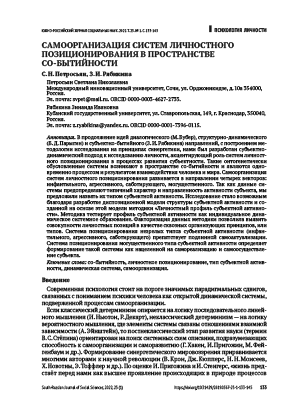Abstract
Developing the ideas set forth by M. Buber, B. D. Parygin, Z. I. Ryabikina, respectively, and establishing the research methodology on the principles of synergy, we worked out a subject-dynamic approach to studying personality which emphasizes the role of personal positioning systems in the processes of subjectivity development. These ontogenetically determined systems emerge occur within the space of co-existence, and are simultaneously the process and the result of the human-world interaction. Self-organization of personal advances in the direction of four vectors: Infantile, Aggressive, Sabotaging, Powerful. As the given systems predetermine the typical character and orientation of a subject’s activity, we offered to qualify them as types of subjective activity. The research became possible due to the development of “The Dispositional Model of the Structure of Subjective Activity” and “The Personal Profile of Subjective Activity” inventory method created on the basis of the above-mentioned Model. This inventory method tests the profile of subjective activity system as an individual systemic formation. Factorization of these techniques makes it possible to identify allowed to reveal sets of personal orientations as cross-cutting organizing principles, or types. The system of positioning immature types of agentive activity (Infantile, Aggressive, Sabotaging) prevents genuine self-actualization. The system of positioning of the Powerful Mighty subjective activity establishes the formation organization of such system as one that is aimed at the self-realization and self-actualization of the subject.
Keywords
References
Бубер, М. (1995). Два образа веры. Москва: Республика.
Бурдьё, П. (1993). Социология политики. Москва: Socio-Logos.
Журавлев, А.Л., Мироненко, И.А. (2012). Система научных представлений Б.Д. Парыгина в области социальной психологии. Психологический журнал, 33(5), 28–38.
Журавлев, А.Л., Мироненко, И.А. (2016). Вклад Бориса Дмитриевича Парыгина в развитие отечественной социальной психологии. Социальная и экономическая психология, 1(3), 4–23.
Знаков, В.В. (2019). Динамический подход к исследованию личности и процессуальный анализ в психологии субъекта. Психологический журнал, 40(5), 27–34, DOI: 10.31857/S020595920006073-6
Знаков, В.В., Рябикина, З.И. (2017). Психология человеческого бытия. Москва: Смысл.
Князева, Е.Н., Курдюмов, С.П. (1994). Законы эволюции и самоорганизации сложных систем. Москва: Наука.
Князева, Е.Н., Курдюмов, С.П. (2002). Основания синергетики: Режимы с обострением, самоорганизация, темпомиры. Санкт-Петербург: Алетейя.
Мунгалов, В.Н. (2012). Психологические пространства человека. Сибирский психологический журнал, 45, 104–111.
Парыгин, Б.Д. (1999). Социальная психология. Проблемы методологии, истории и теории. Санкт-Петербург: ИГУП.
Петросьян, С.Н., Рябикина, З.И. (2020). Типы субъектной активности: субъектно-бытийный подход. В З.И. Рябикина, В.В. Знаков (ред.) Личность и вызовы современности: интерпретация проблем различными научными школами (с. 54–57) Майкоп: Адыгейский гос. ун-т; Краснодар: Кубанский гос. ун-т.
Петросьян, С.Н., Рябикина, З.И., Губанова, Н.Ю., Симаворян, С.Ж. (2021). Стандартизация методики «Личностный профиль субъектной активности». Научные исследования и разработки. Социально-гуманитарные исследования и технологии, 10(3), 45–56. DOI: 10.12737/2306-1731-2021-10-3-45-56
Петросьян, С.Н., Рябикина, З.И., Губанова, Н.Ю. (2021). Структурная валидность методики «Личностный профиль субъектной активности». Гуманизация образования, 1, 41–58. DOI: 10.24411/1029-3388-2020-10148
Рубинштейн, С.Л. (2012). Человек и мир. Санкт-Петербург: Питер.
Рябикина, З.И. (2013). Перспективы исследований личности с теоретико-методологических позиций психологии субъекта. Человек. Сообщество. Управление, 3, 6–19.
Сергиенко, Е.А. (2013). Проблема соотношения понятий субъекта и личности. Психологический журнал, 34(2), 5–16.
Ухтомский, А. (2020). Доминанта. Москва: АСТ.
Hjelle, L., Ziegler, D. (1981). Personality Theories. Basic Assumptions, Research, and Applications. New York: McGraw-Hill.
Allport, G. (1937). Personality: A Psychological Interpretation. New York: Holt, Rinehart, & Winston.
Bandura, A. (1999). A social Cognitive Theory of Personality. In L. Pervin & O. John (Ed.), Handbook of Personality (pp. 154–196). New York: Guilford Publications.
Giordano, P. (2015). Being or Becoming: Toward an Open-System, Process-Centric Model of Personality. Integrative psychological & Behavioral Science, 49. DOI: 10.1007/s12124–015–9329‑z
Giordano, P.J. (2017). Individual Personality is Best Understood as Process, not Structure: A Confucian Inspired Perspective. Culture & Psychology, 23(4), 502–518.
Kuper, N., Modersitzki, N., Phan, Le Vy & Rauthmann, J. (2020). The Dynamics, Processes, Mechanisms, and Functioning of Personality: An Overview of the Field. British Journal of Psychology, 112, DOI: 10.1111/bjop.12486
Milnor, J. (1985). On the Concept of Attractor. Communications in Mathematical Physics, 99, 177–195.
Mironenko, I.A. (2018, February/June). Personality as a Social Process: Where Peter Giordano meets Boris Parygin. Integrative Psychological and Behavioral Science, 52(4). DOI: 10.1007/s12124-018-9417‑y
Nowak, A., Vallacher, R. & Zochowski, M. (2005). The Emergence of Personality: Dynamic Foundations of Individual Variation. Developmental Review, 25, 351–385. DOI: 10.1016/j.dr.2005.10.004
Richardson, M.J., Dale, R., & Marsh, K.L. (2014). Complex Dynamical Systems in Social and Personality Psychology: Theory, Modeling, and Analysis. In H.T. Reis, & C.M. Judd (Eds) Handbook of Research Methods in Social and Personality Psychology (pp. 253–282). Cambridge University Press.
Sato, T., Hidaka, T., Fukuda, M. (2009). Depicting the Dynamics of Living the Life: The Trajectory Equifinality Model. In Dynamic Process Methodology in the Social and Developmental Sciences (pp. 217–240). New York: Springer.
Vallacher, R.R., Read S.J. & Nowak A. (2002). The Dynamical Perspective in Personality and Social Psychology. Personality and Social Psychology Review, 6, 264–263. DOI: 10.1207/S15327957PSPR0604_01
Valsiner, J. & Sato, Tatsuya. (2006). Historically Structured Sampling (HSS): How Can Psychology’s Methodology Become Tuned in to the Reality of the Historical Nature of Cultural Psychology? DOI: 10.14361/9783839402344-010
Valsiner, J. (2009). Integrating psychology within the Globalizing World: A Requiem to the Post-Modernist Experiment with Wissenschaft. Integrative Psychological and Behavioral Science, 43(1), 1–21.
Valsiner, J. (2017). Between Self and Societies: Creating Psychology in a New Key. Tallinn: TLU Press


